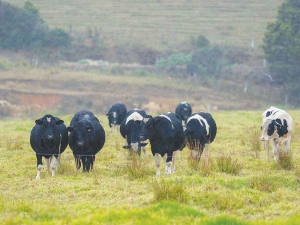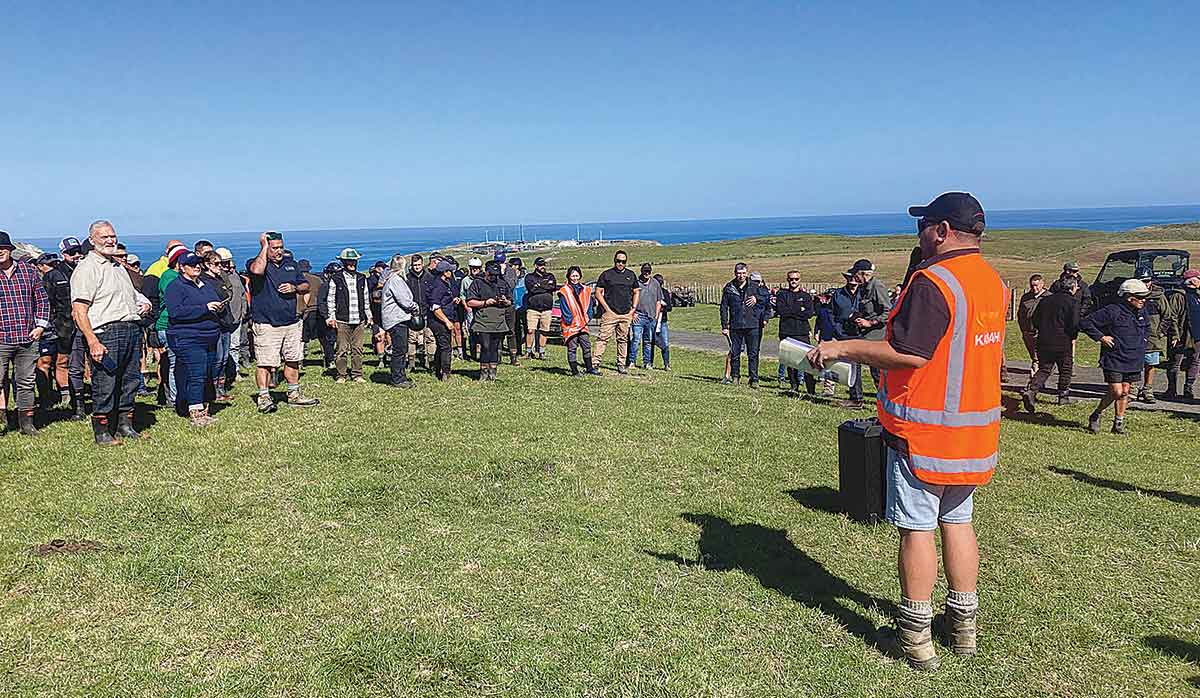Top Māori farm faces costly rebuild after severe storm damage
One of the country's top Māori farms faces a long and costly rebuild to get the property back to where it was before recent storms ripped through it.
 The Whangaroa Ngaiotonga Trust farm runs a state-of-the-art bull fattening operation. Photo Credit: Alphapix
The Whangaroa Ngaiotonga Trust farm runs a state-of-the-art bull fattening operation. Photo Credit: Alphapix
Recently two of New Zealand's top Maori sheep and beef farms held field days as part of the prestigious Ahuwhenua Trophy competition. The two are: Whangaroa Ngaiotonga Trust, northeast of Whangarei, and the proprietors of Tawapata Onenui farm on Mahia Peninsula in southern Hawke's Bay. Reporter Peter Burke attended both field days.
The farm of Whangaroa Ngaiotonga Trust is nestled near the east coast settlement of Whangaruru, about 70km from Whangarei.
It's just over an hour's drive along a windy bushclad, sealed road to the farm on the coast. On a fine day the sight of the Ngaiotonga Marae and the coast is stunning, but on the day of the field day, the much-needed drought-breaking rain arrived.
None of the 200 plus people who attended the field day objected to the rain, which has hit Northland hard, but the planned farm tour proved short-lived. In dry conditions the tracks around the farm are good, however, as the convoy of about 30 four-wheel-drive vehicles started off, the tracks cut up badly and this part of the day had to be abandoned.
Whangaroa Ngaiotonga Trust farm consists of 360ha of coastal hill country land on which it runs a state-of-the-art bull fattening operation. It runs about 1000 bulls in summer, peaking at 1500 in October. About 70% of the bulls are sold for store at 12-15 months with the remaineder going to the works at 24 months. A further 700ha are in a mix of commercial and native forest and wetlands.
The story of Whangaroa Ngaiotonga Trust is one of loss, restoration and resilience over many years. It took them a long time to get their land back and when they did, they found it had debts of four times its value. Since 2020, the trustees, staff and whanau have managed to transform a rundown farm into a profitable, well run bull finishing operation.
To get the farm up to its present state they removed 60ha of gorse, created a 40km network of water pipe supplying 450 micro troughs, put in 57km of fencing and cell systems, and a new farm roading system.
The rain meant that some of the field day presentations planned for various stops on the farm tour were integrated into other presentations at the marae. So big was the crowd that an extra marquee and large television sets were set up outside the whare so the guests could hear the Trust story.
A unique feature of the day was the raw outpouring of emotion, with some speakers reduced to tears when they spoke. This included the co-chair of Whangaroa Ngaiotonga Trust Morris Pita who broke down in tears delivering his presentation. He said the people of Whangaroa Ngaiotonga are overjoyed and proud of having their land back.
"The day was everything we could have hoped for and more. We had the right people in their beautiful whare who had come from all over the motu to celebrate farming and Maori taking great steps forward on behalf of their whenua and community. It's hard not to look and feel the emotion that has come from the day, and it has given us an enormous lift," he says.
Pita says their success has been based on having the right vision, leadership and staff to make prudent decisions quickly, and being very agile as an organisation. He says the leadership at the top has enabled the farm manager, Matt Payne, to do what he does best - making astute decisions on buying and selling stock.
 |
|---|
|
Co-chair of Whangaroa Ngaiotonga Trust Morris Pita. Photo Credit: Alphapix |
A key objective of the trust is to focus on sustainable farming practices that not only ensure the longevity of the property but also appeal to the increasing eco-conscious market.
Fellow co-chair Huhana Lyndo says she was glad it rained because it was a relief for farmers hit by drought. She says entering the Ahuwhenua Trophy is a great learning opportunity and that as an industry we don't open ourselves up for critique.
The Ahuwhenua competition began in 1933 and is designed to encourage Maori farmers to improve their land and their overall farming performance. On a three year rotational basis, the Trophy is competed for by Maori farmers and growers in the sheep and beef, dairy and horticultural sectors. This year the competition is for sheep and beef.
Rocket Farm
Onenui Station, owned by the proprietors of Tawapata South, is located at the tip of the Mahia Peninsula in northern Hawke's Bay, which also just happens to be where the space company Rocket Lab has its launching pad. It is believed this is the only space launch pad based on a working farm in the world.
The farm itself is a 30 minute drive from the small holiday township of Mahia on a beautiful but narrow coastal road. Onenui Station consists of 1700ha of which farmland on which is wintered 15,000 stock units, including 6000 breeding ewes, 600 breeding cows, replacements, and trade cattle. The farm finishes 75% of its sheep and 36% of its cattle, with the remainder sold store. The station has 350 hectares of productive flats, with the balance classified as North Island steep hard hill country
The Trust is in the process of reclaiming more than 1000ha of scrubland and bringing it back into productive use.
Other features of the development on the property include the planting of lucerne to combat the summer dry, the introduction of new genetics to improve calving percentages and growth rates and setting up a trial flock of Wiltshire ewes to assess their performance. They are also doing a lot of environmental work including fencing off coastal faces and making Waikawa Island off the tip of Mahia Peninsular predator free to protect the rare Shore Plover sea bird.
After a formal welcome to the farm, the 350 guests heard a series of presentations from trustees and staff. But the big feature of the day was an opportunity for people to be taken on a lengthy farm tour of this amazing farm on side-by-side vehicles and farm bikes.
The weather was perfect, and the farm tracks were in excellent condition which enabled visitors to take in breathtaking and contrasting views of the steep hill country, the stock run on the farm, the coast and of course getting a unique close-up view of the Rocket Lab launch pad at the tip of the Mahia Peninsular. It was a spectacular day seeing the farm and the long snake of farm vehicles making their way around the property.
The chair of the Proprietors of Tawapata South, Lester White, says he was blown away by the way the day unfolded. He says knew it was going to be a big day but on reflection he says that was understatement.
“I am so grateful for the way in which things have turned out. We have had our whanau here, people from other farms and places, the support of the Ahuwhenua team and even our finalist competitors who came down from Northland to be here with us,” he says.
White says, as an incorporation, the field day confirmed that what they are doing is okay. He says “who would have thought that farming and launching rockets into space would be a match – but it has worked well”. He says huge credit must go to the previous committee who had the foresight to take on the idea of having a space launching pad on the farm.
He says Tawapata is nine years into a 21-year deal with Rocket Lab and says looking into the future they would like to strengthen their relationship with Rocket Lab, but maybe also look at other opportunities.
“We could potentially look at options such as other international partnerships and relationships. What we do know is we can do this,” he says.
 |
|---|
|
Participants at the field day at Onenui Station, Mahia Peninsula. |
The chairperson the Ahuwhenua Trust management committee, Nukuhia Hadfield, says the Proprietors Tawapata South put on a fantastic field day and those attending the day were given a great view of their beautiful farm which is in a very remote place.
“I think it was lovely that we could take our sponsors and people from Wellington who normally can’t get out on farm to ride around Onenui and see the fantastic work that our Maori farmers are doing way out in the country,” she says.
Hadfield says the visitors not only saw a great working farm but some of the environmental work being done to prevent erosion and to care for rare birds.
Fonterra’s impending exit from the Australian dairy industry is a major event but the story doesn’t change too much for farmers.
Expect greater collaboration between Massey University’s school of Agriculture and Environment and Ireland’s leading agriculture university, the University College of Dublin (UCD), in the future.
A partnership between Torere Macadamias Ltd and the Riddet Institute aims to unlock value from macadamia nuts while growing the next generation of Māori agribusiness researchers.
A new partnership between Dairy Women’s Network (DWN) and NZAgbiz aims to make evidence-based calf rearing practices accessible to all farm teams.
Despite some trying circumstances recently, the cherry season looks set to emerge on top of things.
Changed logos on shirts otherwise it will be business as usual when Fonterra’s consumer and related businesses are expected to change hands next month.

OPINION: Here w go: the election date is set for November 7 and the politicians are out of the gate…
OPINION: ECan data was released a few days ago showing Canterbury farmers have made “giant strides on environmental performance”.